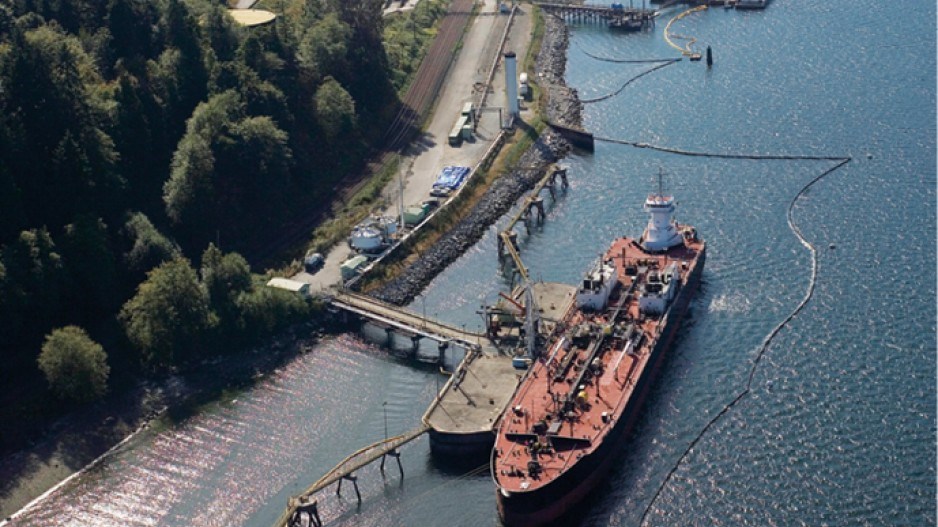For some of the most outspoken opponents of Kinder Morgan Canada’s plans to spend $5.4 billion to increase the capacity of its Trans Mountain pipeline system to 890,000 from 300,000 barrels per day, it’s not really about the pipeline itself at all.
It’s about the fact that it would transport oilsands crude, which many opponents – such as Burnaby Mayor Derek Corrigan – see as “dirty oil.”
“The pipelines have become a surrogate for the debate about oilsands development,” said Barry Robinson, a Calgary-based staff lawyer for the environmental law organization Ecojustice, which is one of more than 2,000 individuals or organizations that have applied to the National Energy Board (NEB) to either comment or intervene at hearings for Kinder Morgan’s application to expand the existing 60-year-old pipeline.
Robinson said he and his clients would rather see a debate about that “dirty oil” than about the pipelines (or railcars) that carry it.
“The terms of reference for the NEB hearing process don’t allow the upstream impacts [oilsands production itself] to be on the table,” he said, adding that only GHG (greenhouse gas) and other direct environmental impacts from the pipeline itself, as well as pipeline safety and marine tanker traffic, can be discussed.
What is needed, Robinson said, is a national debate about oilsands development, but the federal government won’t allow that debate to take place.
“Nobody likes the words ‘national energy strategy,’ but since 97% of Canada’s oil reserves are in the oilsands, we need to have a national discussion about how much of that resource we develop and at what pace.”
Robinson acknowledged that many pipeline opponents recognize that the Trans Mountain expansion project is not as disruptive as greenfield pipeline projects, such as Northern Gateway or Keystone XL, since more than 70% of the expansion would involve looping new line through an existing right-of-way.
In addition, he said the alternative to pipelines is to move more oilsands production by rail, which environmental groups have difficulty opposing since the bitumen moves on existing rail lines. Meanwhile, he said, there are legitimate concerns about the dangers of a leak from the pipeline, from increased tanker traffic as a result of the expansion or from other direct impacts.
But the real debate is about oilsands expansion, he said.
“CAPP [Canadian Association of Petroleum Producers] has forecast oilsands production will grow from about two million barrels per day now to five million barrels per day by 2030. What is driving the need for that?”
The answer to that question comes from the man who heads the organization that represents ship owners, BC Ferries, cruise lines, port authorities and other marine-related interests on the West Coast.
“The economy of Canada needs these [pipeline] projects,” said Stephen Brown, president of the Vancouver-based Chamber of Shipping of British Columbia. “Canada needs to diversify its markets for the export of our products.” (Much of the additional crude on the Trans Mountain line would end up in Asia).
He scoffs at arguments that the tanker traffic expansion to transport the additional crude, up to 400 tankers per year from 60 per year into Burrard Inlet from Kinder Morgan’s Westridge Marine Terminal, would be dangerous. In fact, he said, all 17 port facilities on the B.C. coast are chronically underused, and the expansion of shipping traffic is badly needed.
About 3,500 ships a year move on the B.C. coast, about 3,000 of them from the port of Vancouver, said Brown, who testified at the NEB hearings about Northern Gateway and will likely comment at the Trans Mountain hearing.
“By contrast, the port of Rotterdam gets 10 times that many [almost 40,000 ship movements per year], the port of Singapore gets 130,000 per year, and there are 600 ship movements per day through the port of Dover [between England and France].”
Brown said the shipping industry in the Vancouver area could handle 10,000 ship movements per year “and that would not create any challenges.”
Asked about Robinson’s comment that critics have treated pipelines as a surrogate for their real target, which is oilsands development, Brown said, “[Robinson] was being brutally honest. The real issue isn’t pipeline safety or marine safety. There is no issue with safety in the marine sector.”
He said spill response measures in place are “better than anywhere in the world,” and he is confident that any spill could be easily contained.
Corrigan said he remains concerned about Kinder Morgan’s plans to triple its Burnaby Mountain oil storage capacity and by the pipeline routing near and in his city. He said his opposition to the project is also based on concerns about his community being a conduit for “dirty oil.”
Greg Toth, senior project director for the Trans Mountain expansion, said Kinder Morgan isn’t surprised by the amount of interest in the project from opponents and supporters.
“Our approach is to focus on what actions Trans Mountain can take to address issues within the scope of our project. That said, we recognize and acknowledge our overall role in the industry supply chain and are doing our part to minimize impacts, but the broader issue is an issue of national policy. We understand there’s more interest and scrutiny than ever before on pipelines and in our proposed expansion, and are doing our best to address the list of issues defined by the NEB.”




